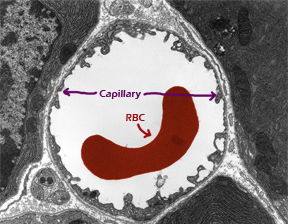Why we have lungs
Does that mean then, that diffusion has no place in gas exchange of larger organisms? Not at all, once air is in the lungs, gases get exchanged though...none other than diffusion. The lung is subdivided, ultimately, into millions of tiny sacs called alveoli, each of which has a thickness of only 0.5 to 1 micrometre. Each alveolus is surrounded by capillaries,and it takes blood about 1 second to pass through these capillaries.
 |
|
However, when you get a nasty cold, or a case of pneumonia, the lung tissue can swell and thicken enough to endanger your ability to breathe!
 There’s a second place where diffusion is vital in gas exchange: capillaries are the
very thin, small blood vessels through which gases are exchanged with cells. The cells making
up the walls of the capillaries are around 1 micrometre thick, so gases can diffuse directly
through them in the same amount of time as above (0.00028 seconds).
There’s a second place where diffusion is vital in gas exchange: capillaries are the
very thin, small blood vessels through which gases are exchanged with cells. The cells making
up the walls of the capillaries are around 1 micrometre thick, so gases can diffuse directly
through them in the same amount of time as above (0.00028 seconds).
Copyright University of Maryland, 2007
You may link to this site for educational purposes.
Please do not copy without permission
requests/questions/feedback email: mathbench@umd.edu
